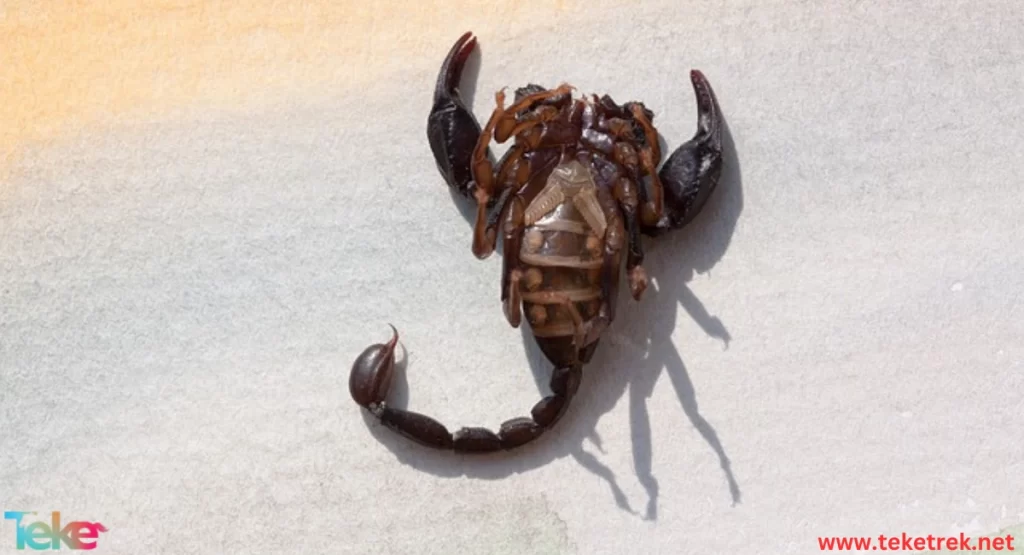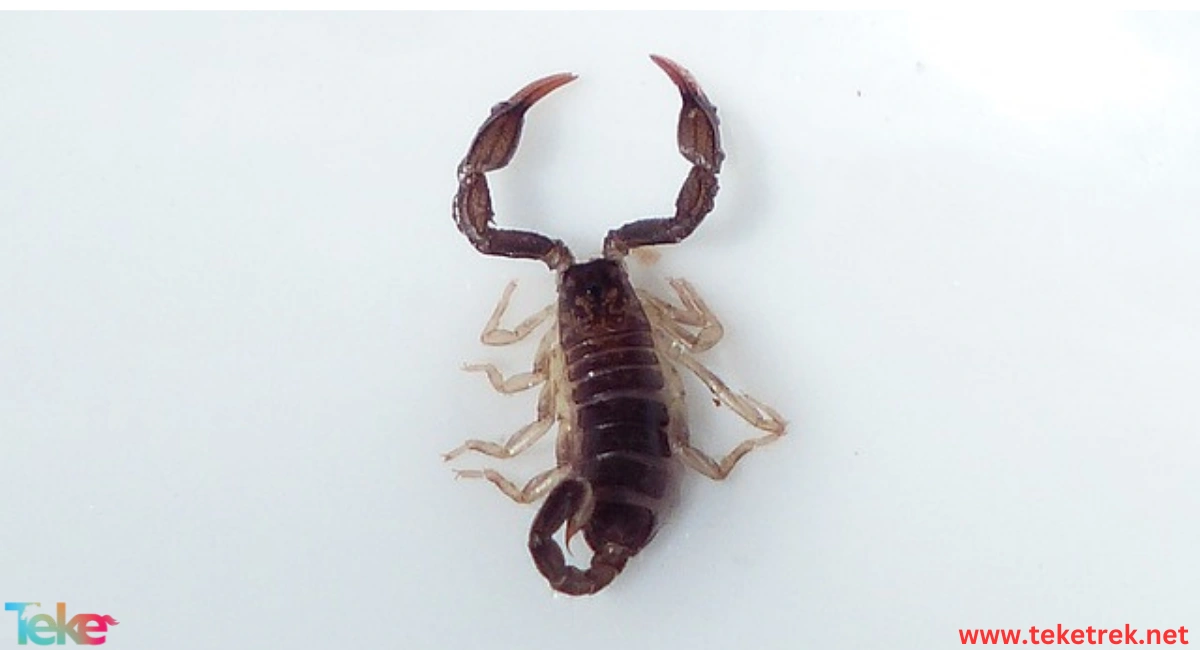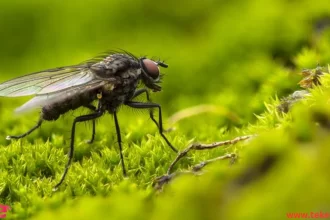The scorpion is a small creature with a distinctive tail and strong claws. It arouses people’s curiosity and terror at the same time. It is considered one of the invertebrate animals that spread throughout the world. Characterized by their powerful venom and their ability to adapt to their surrounding environment, the study of scorpions is an interesting aspect of the world of zoology, revealing fascinating details about their adaptations and behavior.
Despite their small size, scorpions possess a set of characteristics that make them unique creatures in the animal world. Scorpio is distinguished by its ability to survive in harsh conditions. It also has a unique lifestyle that includes hunting prey and defending itself with its powerful venom.
Understanding the scorpion’s lifestyle and its role in the ecosystem is essential for maintaining biological balance in nature. In this article in TekeTrek Website, we will introduce you to the most important information related to this object. Follow along with us.

About the scorpion
- The name scorpion or scorpion is given to both males and females. It is a genus of poisonous insects, an order of invertebrate animals that belong to the arachnid family.
- There are 2000 species of it on Earth. Most scorpions are poisonous, as the poisonous gland is located at the end of the tail, and the bite of some species is considered very dangerous to humans compared to a snake bite.
Here are the most important types of deadly scorpions
1. Bark Scorpion:
It is the most venomous scorpion in North America and some parts of South America.
The barking scorpion is found in small crevices, tree bark, and woodpiles.
The sting of the barking scorpion contains a neurotoxin that causes severe pain similar to electric shocks and causes numbness and vomiting in addition to diarrhea.
A scorpion bite is considered fatal if the victim does not receive anti-venom quickly.
No deaths due to these scorpions have been recorded in the United States of America in the last 40 years
2. Arabian fat-tailed scorpion (Androctonus crassicauda):
It is considered one of the most poisonous scorpions in the region.
The Arabian scorpion is distinguished by its large size.
The original homeland of the Arabian scorpion: Saudi Arabia, Kuwait, Qatar, Iraq, Iran, Turkey, and North African countries.
Common symptoms of sting: seizures, high blood pressure, and loss of consciousness.
3. Yellow Fattail Scorpion:
This species lives in North Africa and Southeast Asia.
The yellow scorpion possesses a powerful neurotoxin that attacks the victim’s central nervous system, whereby she dies within two to seven hours of being exposed to the poison.
4. Spitting Thicktail Black Scorpion:
The spitting scorpion is endemic to South Africa and is one of the largest scorpions.
The spitting scorpion has two types of venom, the first is for warning and paralyzes small prey, and the second is for killing.
Symptoms of its bite include severe pain, sweating, muscle spasms, and heart palpitations.
The spitting scorpion can spit venom up to 3 feet away. This venom may cause temporary blindness and may permanently damage the eyes.
5. Palestine yellow scorpion (Leiurus quinquestriatus):
It is considered the most dangerous type of scorpion around the world.
Known as the death scorpion or death stalker.
The Palestine scorpion lives in the Arabian Desert, the Sahara, and Central Asia.
Its bite does not cause death in adults if anaphylactic shock does not occur.
Its bite causes an increase in heart rate, high blood pressure, in addition to convulsions that may cause complete comas.
Types of non-venomous scorpions
- Scorpio Emperor.
- Tanzanian red-clawed scorpion.
- Malaysian black scorpion.
- Forest scorpion.
- Giant hairy scorpion.
- Scorpion with a huge claw.
- Scorpio the dictator.
- Asian forest scorpion.
Scorpio food
- Scorpions feed mainly on small insects, worms, spiders, cockroaches and other small animals. Scorpions are also nocturnal animals, often active at night when small insects are active and moving.
- Some types of scorpions may also feed on small animals such as mice or other rodents, but this is only in rare cases in which the scorpion has the opportunity to catch its prey.
Interesting facts about Scorpio
1. Its ability to withstand: The scorpion has the ability to survive in very harsh conditions, such as drought and lack of food, as it can live for several months without eating.
2. Adaptation to harsh environments: The scorpion can live in diverse environments including deserts, forests, mountains, and plains, which demonstrates its ability to adapt to a variety of environmental conditions.
3. Its different toxicity: The strength of scorpion venom varies between different species, as the venom can be fatal to humans in some species, while pain results from the sting of other species.
4. Great diversity: There are about 2,000 known species of scorpions around the world, and they vary in sizes, colors, and behavior.
5. Self-protection: Scorpio has a developed system for defending itself.
6. His sensitive senses: Scorpio relies on his sensitive senses, such as the auditory, sensory, and tactile senses, to search for food and identify enemies and potential partners.
7. The scorpion does not chew food like mammals. Rather, it secretes digestive enzymes that help it break down the prey’s tissues into a liquid form, and then absorbs this nutritional liquid resulting from the prey through its skin. This process is called external digestion and is a common method of digestion among many animals such as scorpions, spiders, and cockroaches.
Scorpio environment
Scorpions live in hot and dry areas, hiding under stones and rocks and in burrows and crevices in search of moisture and to avoid the heat of the sun.
Scorpio reproduction
- Most scorpions reproduce by the interaction of males and females, although many species of scorpions reproduce by parthenogenesis.
- Scorpio mating may take place in spring or summer, when the temperature is suitable for egg growth.
- After mating, the female lays eggs inside a small hole in the soil or another suitable environment.
- The number of scorpion eggs laid can number in the dozens or even hundreds depending on the species and size of the scorpion.
- When the eggs hatch, tiny larvae emerge from them, resembling a small version of an adult scorpion.
- These larvae spend a period of growth and development to become adult scorpions that are able to reproduce in turn.
- It should be noted that some types of scorpions take care of their young after hatching and provide them with protection and care until they are able to survive and search for food on their own.
What are the most important dangers of Scorpio
There are many dangers caused by Scorpio, here are the most important:
1. Scorpion stings:
Scorpion stings are considered one of the most dangerous dangers that a person may face, as they contain toxic substances that may cause serious effects on health.
2. Dermatitis:
Skin inflammation may occur as a result of a scorpion sting, leading to severe itching and swelling in the affected area.
3. Effects on the nervous system:
Scorpion stings may cause negative effects on the nervous system, leading to symptoms such as headaches and dizziness.
4. Shock and difficulty breathing:
In rare cases, scorpion stings may cause shock and difficulty breathing due to the effects of the venom on the body.
5. High temperature:
The affected person may feel a rise in temperature as a result of the scorpion sting and the effects of the venom on the immune system.


6. Muscle spasms:
Scorpion stings may cause severe muscle spasms that lead to pain and difficulty moving.
7. Blunt trauma:
In rare cases, scorpion stings can cause severe, life-threatening trauma to the affected person.
8. Disturbances in heart function:
Scorpion stings can lead to disturbances in heart function, making the situation even more dangerous.
9. Risk of allergy:
A person with a scorpion sting may be at risk for anaphylaxis, which increases the severity of side effects.
10. Risk of infection:
If scorpion stings are not treated properly, they can increase the risk of infection in the affected area.
What is the benefit of scorpion venom?
Although scorpion venom is toxic and can be dangerous to humans, there are some potential medical uses for scorpion venom. Among these uses:
1. Medical research:
Scorpion venom is used in medical research to understand its effects on the immune and nervous systems, and this may contribute to the development of new treatments for diseases such as cancer and multiple sclerosis.
2. Pain relief:
It is believed that some components of scorpion venom may contain substances that help relieve pain, and therefore it may be used in some traditional treatments.
3. Treating cases of spasticity:
It is believed that some components of scorpion venom may be effective in treating muscle spasms, and may be used in some research to understand how they affect the nervous system.
4. Study of the immune system:
Scorpion venom is used to study the immune system and how it reacts to certain substances, which can help understand the mechanisms of immune reaction and develop new treatments.
5. Pharmaceutical production:
Some companies use components of scorpion venom in the production of some medicines that may be effective in treating some diseases.
Please note that the use of scorpion venom in medicine requires careful studies, research, and clinical trials to ensure the safety and effectiveness of treatments based on this venom.


Frequently asked questions about Scorpio
There are many questions that interest people about this strange creature, here are the most important ones:
- Does a scorpion die when it stings itself?
The scorpion’s venom only affects it due to the heat of the fire. When it is surrounded by fire, it stings itself until it dies.
- Where do scorpions come from?
Scorpions enter homes in search of food and water, or when the home contains other insects such as ants and cockroaches.
- Which are the most dangerous scorpions, black or yellow?
The black scorpion is considered one of the most dangerous poisonous scorpions in the world.
- Are scorpions harmful?
Scorpion are painful but rarely life-threatening.
- Do scorpions have 10 legs؟
No, Scorpions have eight legs.
In short, it can be said that the scorpion is a controversial creature that carries in its toxic venom opportunities for medical benefit, but it also poses a serious threat to humans. We must be careful when dealing with this organism, and at the same time we urge further exploration of the potential medical benefits of scorpion venom through future research and studies.
Understanding the effects of scorpion venom can contribute to the development of new treatments for many diseases, but this must be done with caution and guidance by experts in the medical field






